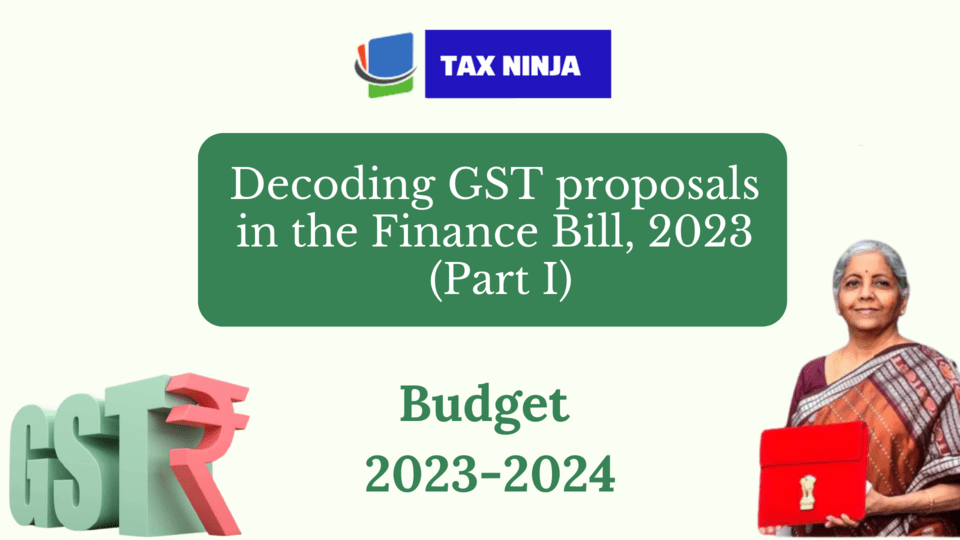

The Union Budget 2023 presented by Finance Minister Nirmala Sitharaman has put forth several modifications to the GST Act.
Here's a clause-by-clause analysis for the proposed amendments.
Clause 128 - Composition Scheme Benefit to e-commerce Goods Suppliers : The 2023 Budget has proposed the extension of the Composition Scheme to registered individuals which was earlier not available to registered persons supplying goods through e-commerce operators. The restriction on registered persons supplying goods through e-commerce operators from opting into the Composition Scheme has been lifted by amending Section 10 of the CGST Act, 2017.
You can read more here : https://taxninja.in/blog/budget-2023-composition-scheme-benefit-to-e-commerce-goods-suppliers
Clause 129 - Alignment of Payment Clause for Reversal of Input Tax Credit in the Event of Invoice Non-Payment within 180 Days : The Second and Third Provisos of sub-section (2) in section 16 of the CGST Act are being amended to conform to the return filing system specified in the Act. This change pertains to the condition for Input Tax Credit (ITC) eligibility, which requires payment to the supplier within 180 days.
As per the current provisions, if the recipient failed to pay the supplier within 180 days, they were required to add the ITC taken to their "Output tax liability".
However, since GSTR-2 and GSTR-3 were not brought to the picture, the provisos needed to be altered to eliminate the "addition to output liability" for ITC if payment to the supplier was not made within 180 days.
This amendment aligns the provisos with the return filing system and eliminates any confusion or inconsistencies regarding the disclosure of ITC reversal in cases of non-payment to the supplier within 180 days of the invoice date.
Clause 130 - Part A : Inclusion of Warehouse Sales in Value of Exempt Supply : Section 17(2) of the CGST Act states that when a registered person provides both taxable and exempt supplies and uses inward supplies for both, the input tax credit for such inward supplies can only be claimed for the taxable supplies. The proportionate input tax credit calculation is described in Rule 42 of the CGST Rules.
Budget 2023 is propsosing to amend Section 17(3) of the CGST Act to restrict the availment of input tax credit for certain transactions, including the sale of warehoused goods to individuals before clearance for home consumption. The value of such transactions will now be included in the value of exempt supply. This change expands the definition of exempt supply to include these warehoused goods, making the supply of these goods before clearance for home consumption subject to input tax credit reversal.
However, input tax credit reversal will not be required for high sea sales, supply from non-taxable territory to another non-taxable territory, or certain other supplies as specified in Schedule III of the CGST Act. The value of these transactions will be notified by the government.
Part B : ITC no longer permitted on CSR expenditures : The allowance of Input Tax Credit (ITC) for expenses related to Corporate Social Responsibility (CSR) under GST has been a contentious issue, with conflicting opinions and rulings. The 2023 Union Budget has resolved this debate by proposing changes to the Goods and Services Tax (GST) Act, stating that ITC will no longer be allowed for goods or services used for CSR obligations outlined in section 135 of the Companies Act, 2013.
You can read more here : https://taxninja.in/blog/budget-2023-itc-no-longer-permitted-on-csr-expenditures
Clause 131 - Exemption from Compulsory Registration u/s 23 of the CGST Act : Section 23(1) and (2) of the CGST Act has been proposed to be amended retroactively, from 01st July, 2017, to provide that persons required for compulsory registration in terms of Section 22(1) and 24 of the CGST Act do not need to register if exempt under Section 23(1), such as those engaged exclusively in the business of exempt supply of goods or services or agriculturists to the extent of supply of produce out of cultivation of land.
You can read more here : https://taxninja.in/blog/budget-2023-exemption-from-compulsory-registration-23-of-the-cgst-act
Clause 132, 133, 134 and 135 - Three-Year Time Limit for Furnishing GST Returns : The Budget 2023 has proposed to prescribe a due date for filing returns with an upper limit of three years from the due date. The GST law has established a deadline for submitting returns however this previously lacked an upper limit. Now, upper limit (maximum time limit) of due date is proposed to be provided in GST Law which means that returns such as GSTR-1, GSTR-3B, GSTR-9, GSTR-9C, and GSTR-8 cannot be filed after the expiration of three years from their respective due dates.
You can read more here : https://taxninja.in/blog/budget-2023-three-year-time-limit-for-furnishing-gst-returns
Clause 136 - Eligibility for Provisional Refund Extended to Provisionally Accepted Input Tax Credit : Amendments to sub-section (6) of section 54 of CGST Act is being made to remove reference to provisionally accepted Input Tax Credit and align with self-assessed Input Tax Credit scheme as per section 41(1).
The words “excluding the amount of input tax credit provisionally accepted” will be omitted from sub-section (6) of Section 54, which will bring about uniformity in the treatment of input tax credit and also simplify the provision for provisional refund.
This amendment will now make provisionally accepted ITC eligible for provisional refund, up to 90% of the total amount claimed for zero rated supplies.
Clause 137 - Streamlining Interest on Delayed Refunds : Budget 2023 has proposed an amendment to Section 56 of the Central Goods and Services Tax (CGST) Act. This amendment is aimed at providing an enabling provision to prescribe the manner of computation of the period of delay for calculating interest on delayed refunds. The proposed amendment empowers the government to prescribe the manner in which interest on delayed refunds will be computed. Additionally, the conditions and restrictions subject to which interest on delayed refunds will be granted can also be prescribed by the government.
Next Part of this blog can be read here :